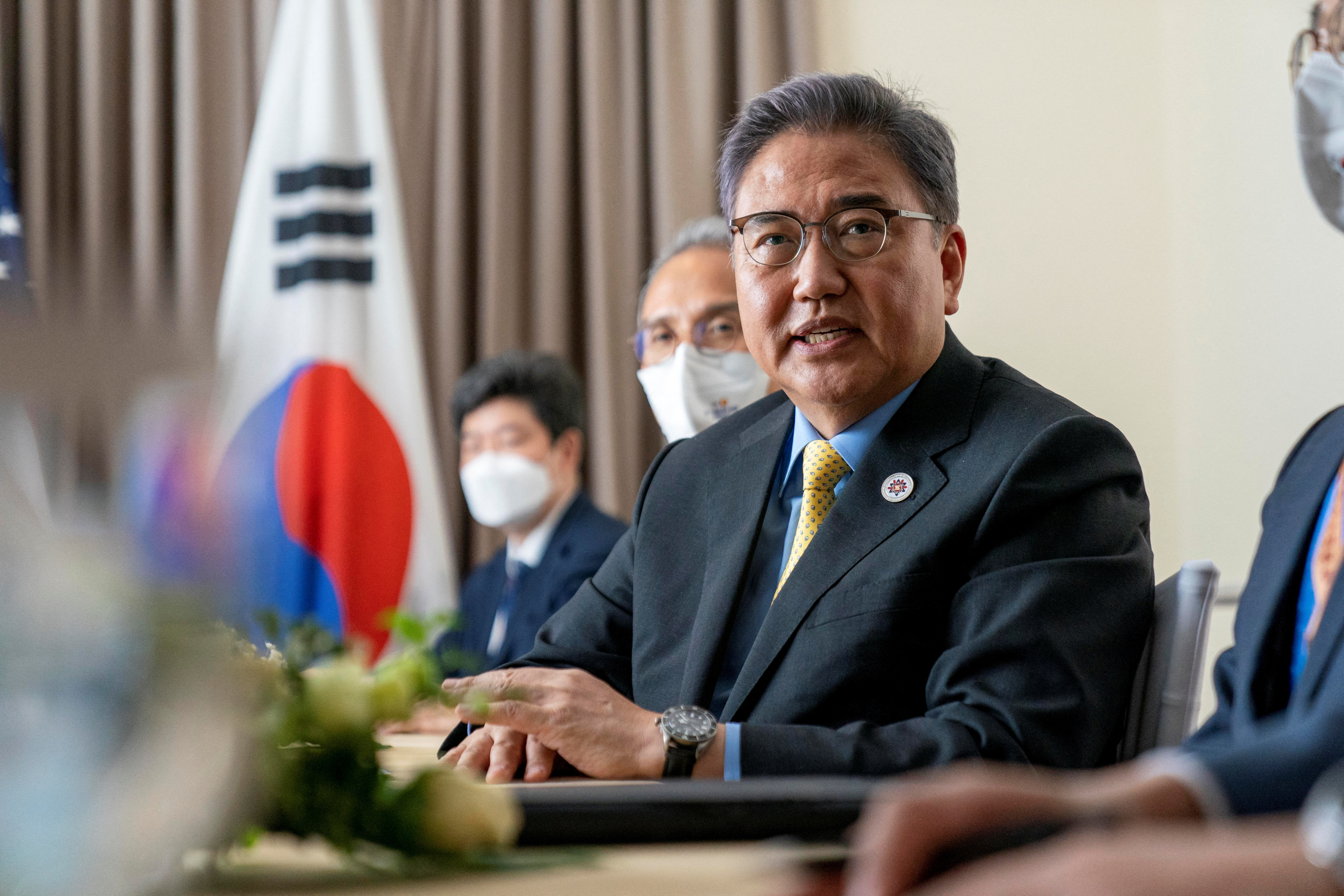Reuters:
In first visit to China, South Korean foreign minister seeks to reassure Beijing over U.S. ties

South Korean Foreign Minister Park Jin meets U.S. Secretary of State Antony Blinken at the Sokha Hotel in Phnom Penh, Cambodia, Friday, August 5, 2022. Andrew Harnik/Pool via REUTERS
SEOUL, Aug 8 (Reuters) - South Korea foreign minister Park Jin is set for his first visit to China on Monday as President Yoon Suk-yeol's government seeks to reassure Beijing about their relationship despite stronger ties with the United States and tensions over Taiwan.
Park is scheduled for a three-day stay in the eastern port city of Qingdao, during which he will hold talks with Chinese Foreign Minister Wang Yi, Seoul's foreign ministry said. Park is the first high-level official to travel to China since Yoon took office in May.
His trip comes after Beijing expressed outrage over U.S. House Speaker Nancy Pelosi's visit to Taiwan last week. China claims the self-governed island as its own. read more
Yoon faced criticism from lawmakers - some from his ruling party - for not meeting with Pelosi. Yoon, who was on vacation, held a phone call with her instead. His office said that the decision was made in consideration of national interests, and that there was no pressure from Beijing. read more
Stakes are high for Park's visit, as Seoul walks a fine line between its alliance with the United States and with China, South Korea's top trade partner, amid their intensifying rivalry.
Park has said his trip would be a chance to reduce misunderstandings and boost cooperation in areas including trade, health and environment.
"By actively promoting strategic high-level communication, we can have better understanding of each other, reduce unnecessary misunderstanding and expand common interests," he said at a news conference.
Park noted that when he met Wang at the G20 foreign ministers' meeting last month in Thailand, he said South Korea's strengthening U.S. alliance and participation in a U.S.-backed economic forum for Asia, which Beijing said was designed to decouple countries from its economy, was not meant to "neglect or set aside" China ties.
Both sides also face a potential flare-up over the THAAD U.S. missile defence system stationed in South Korea, as well as Seoul's possible participation in a U.S.-led chip alliance involving Taiwan and Japan, which China opposes. read more
Yoon vowed to purchase and deploy another THAAD battery, and abandon his predecessor's promise in 2017 to China of the so-called "Three Nos" – no additional THAAD deployments, no participation in a U.S.-led global missile shield, and no creation of a trilateral military alliance involving Japan. read more
China argues the system's powerful radar could peer into its airspace, and relations suffered a setback after China sharply cut trade and cultural imports.
Beijing's foreign ministry has been calling for Seoul to keep the promise, but Park told a recent parliamentary questioning that the "Three Nos" are not an official pledge or agreement.
The Yonhap news agency reported on Monday that South Korea has decided to attend a preliminary meeting for the chip pact, dubbed "Chip 4," citing an unnamed senior presidential official.
Yoon said his government is looking into the issue in light of national interests, and the foreign ministry said no decision has been made.
South Korea largest trade is with Tiongkok, smaller but still important trade with USA, and even more important trade with the rest of the world is contingent on its alignment with the international trading and financial system.
ReplyDeleteThe USA is still South Korea's ultimate security partner, especially with Kim Jong Un daily threatening annihilation.
So South Korea continues to play its balancing act.
Tiongkok should not have veto power over THAAD. The missiles cannot reach Tiongkok, and the warheads designed to intercept ballistic missiles are too small to be used on any ground targets. For The THAAD ballistic missile launch tracking radar to cover North Korea territory, it inevitably covers part of Tiongkok territory as well, that is a function of geography.
Tiongkok extending sovereignty and territorial integrity rights to include electronic Radar detection range is too long a stretch of the bow, and no country in the world will accept that kind of bullying interference.
Take for example.. Singapore defence radar systems cover large parts of Malaysian territory...
So What ?
Its just radar signals.. Malaysia has no right to object...
Parading ur know nothing fart AGAIN!
ReplyDelete"sovereignty and territorial integrity rights to include electronic Radar detection range"
Shout that theme to yr uncle Sam. Don't forget to mention - “do unto others as you would have them do unto you”!